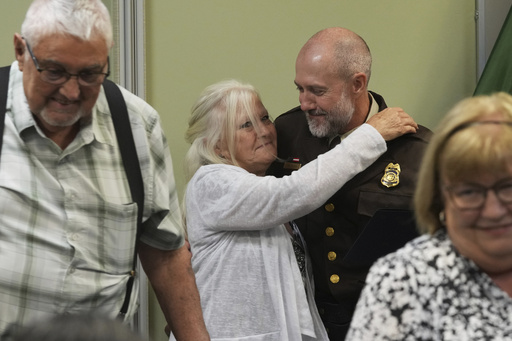
DANIA BEACH, Florida — As immigration continues to be a central issue for the Trump administration, particularly following a fiercely polarized electoral season, Border Patrol agents are confronting increasing difficulties both on the job and beyond. Many have begun training as chaplains to support their colleagues as they deal with threats from dangerous cartels prevalent in border dynamics and witness the hardships faced by migrants. This occurs amidst constantly changing policies from Washington and escalating public outrage directed at them.
“The toughest part is that people don’t fully understand our roles, and we face significant backlash,” shared Brandon Fredrick, an agent stationed in Buffalo, New York, who has encountered name-calling from even some family members. Earlier this month, he served as an instructor at a training academy for Border Patrol chaplains, whose ranks have nearly doubled in the past four years. They aim to assist agents striving to secure U.S. borders in managing the rising emotional toll that can lead to personal crises like addiction, family breakdown, or even thoughts of suicide.
During the recent training, held at a Border Patrol station near Miami, Fredrick observed pairs of trainees acting out scenarios involving fellow agents who had been absent from work. In one case, they discovered an agent who had turned to alcohol to cope with the stress of being away from his family during the holidays, reflecting the real struggles of those deployed in high-stress border areas.
Engaging with chaplains allows agents to share their emotional burdens, as Fredrick noted, saying, “My daily mission is to ensure no young agent suffers in silence.” A Catholic and agent for over 15 years, he has dealt with tragic incidents, including cases of migrant smuggling that led to grievous outcomes.
Chaplains offer confidential emotional support, drawing from their personal faith experiences, though their training primarily involves agents from within their ranks. Upon graduation, they integrate back into their normal responsibilities while remaining available for support for their approximately 20,000 colleagues.
While most of the current chaplains are Christian, there has been recent inclusion of Muslim and Jewish agents. They refrain from introducing faith unless the individual seeking help brings it up. “I’m not here to convert anyone,” explained Jason Wilhite, a chaplain and trainer in Casa Grande, Arizona, who previously participated in a peer support initiative after a colleague’s tragic passing.
Agent Jesus Vasavilbaso joined the peer support program after encountering repeated trauma from responses to lost migrants in the harsh Tucson desert. He emphasized the necessity of mutual check-ins among colleagues, stating, “Sometimes you go home and feel haunted by those you couldn’t save.”
Training sessions at the academy encompass realistic scenarios, such as responding to fatalities involving fellow agents. During these exercises, the emphasis is on aiding distressed agents. Chris Day, who has served as a chaplain since 2017, guided trainees in comforting an agent impacted by a partner’s death, stressing the importance of genuine connection over empty reassurances.
Day shared personal experiences of comfort he provided to agents distraught after witnessing traumatic incidents, highlighting the importance of empathy in their roles. As he described, “The sights and smells are unforgettable; they profoundly affect us and our compassion for both migrants and agents alike.”
Agents also face the emotional burden of caring for unaccompanied migrant children in their custody. Trinidad Balderas and Yaira Santiago shared their commitment to offering solace amidst the chaos children experience when crossing the border. Santiago, a former educator, mentioned the importance of positivity in her interactions: “I strive to provide reassurance within the limits of my role.”
Spencer Hatch, a Border Patrol assistant chief and chaplaincy program manager, emphasized balancing law enforcement’s stringent demands with the humanitarian aspect of their duties, insisting on the necessity of addressing emotional repercussions on agents’ families from the heightened stress of migrant surges.
Agents face challenges at home as well, particularly in communities where their occupation may be viewed unfavorably. Many are reluctant to disclose their roles to their children for fear of backlash, as agents may find their children attending school with peers from cartel-affiliated families or families of undocumented migrants. “Navigating these dynamics can be really tough, especially with public perception swinging dramatically,” Hatch explained.
Hatch pointed to a significant incident in 2021 involving agents on horseback that provoked widespread criticism despite a formal investigation clearing them of wrongdoing. He described the demoralizing effects of such portrayals on agents’ self-perception and morale.
Challenging the disconnect caused by public opinion regarding immigration enforcement, Tucson-area chaplain Jimmy Stout noted the need for agents to align their actions with their personal values, shedding light on the moral complexities faced daily. As chaplains and agents alike grapple with these conflicting emotions, their mission remains clear: to support one another through adversity.
Class speaker Matt Kiniery, who joined the Border Patrol after serving in the Army, expressed how his own life-altering experience reinforced his commitment to chaplaincy. “I was spared for a reason, and I’m here to help my fellow agents,” he shared, moving fellow classmates to tears as he encouraged them to be present for one another, highlighting the profound impact of their roles.
